[Fall Workshop 2012] Resource List
Quick Links
- Mobile Learning, An Evolving User Experience Perspective
- Virtual Learning Environments at Thompson Rivers University
- The Camosun Learning Commons – Learning Spaces as Catalyst for Change
- Instructure Canvas & the Mobile Student
- Can We Talk? Unpacking Identity in Space
- Into the Wild, In Service
- Pedagogical Lessons Learned as Students and Facilitators in Massive Online Open Courses (MOOCs)
[hr]
Mobile Learning, An Evolving User Experience Perspective
Paul Hibbitts, Hibbitts Design
Paul Hibbitts shared some of his most recent mobile design experiences and challenges and discussed his approach to design, analysing the user experience including learners’interactions with mobile devices and discussing the techniques and tools he employs in mobile-first design. Participants were particularly taken with Twitter Bootstrap (a responsive HTML framework) and Jetstrap, two useful tools for us to explore.
Virtual Learning Environments at Thompson Rivers University
Rob Swanson, Jon Fulton, Oliver Harrison and Bob Byrne, TRU Open Learning Media Team
The media team from TRU Open Learning showed virtual learning environments they have created including tours of a water treatment plant, an art exhibition and the TRU campus. Participants remarked upon the capacity to safely take learners into environments they might not have access to, the opportunity to share learner’s work with a broader community and the potential to embed learning and assessment activities within the VLEs. You can learn more at their site: barabus.tru.ca/mediateam/
The Camosun Learning Commons – Learning Spaces as Catalyst for Change
Sybil Harrison, Rob Peressini and Nancy Sly, Camosun College
Sybil Harrison and Nancy Sly showcased the new Learning Commons and provided insights in to the difficulties and challenges involved in creating such a space that will become a gathering place and a source of pride for the entire community. Workshop attendees were interested in what appear to be important keys to the success in planning and executing the project: considering the overall service, not merely the space or the technology; collaborating and sharing among different organizational units, and a sincere effort to have “a decision-making process that was inclusive, representational, and distributed.”
- Session description
- Audio recording
- Presentation Slides
- BCLA Submission
Instructure Canvas & the Mobile Student
Lynda Williams and Kar-On Lee, Simon Fraser University
Kar-On Lee and Lynda Williams discussed SFU’s decision to be move to Instructure Canvas as the primary LMS for course delivery. They gave an overview of the selection process and the learning curve behind the move from WebCT as well as the plans for implementation and concerns about privacy. Participants were interest to hear about the tools and plug-ins available for Canvas as well as the plans for training and migration.
Can We Talk? Unpacking Identity in Space
Amy Perreault and kele fleming, University of British Columbia
Amy Perrault and kele fleming of UBC led a an interactive session in which we explored questions of identity and engaged in activities designed to elicit ideas about learning environments and facilitating the creation of community and understanding of identity in learners.
Thought-provoking questions and takeaways included
- What if you were tasked with designing a pedagogical approach to a course? What would be important in this process? History? Identity? Where participants from? What elements would be needed?
- Is it possible to connect students to the greater community and create a sense of identity with the academic community or research community?
- Can more interactive lectures engage students and help them develop a sense of identity and community with those around them?
[hr]
Into the Wild, In Service
Brian Lamb, Thompson River University
Brian Lamb, (Re-)Director of Innovation in Open Learning at TRU discussed the benefits and difficulties of trying to design authentic learning experiences, experiences that are opportunities for learners to face real-life situations resulting in enthusiastic participation from students, as well as authentic, useful public resources. Brian showed the Wikipedia Education Program as an example of such approaches which locate the “student as producer” and offered a variety of authentic learning opportunities for participants to consider including Galaxy Zoo, Folding Proteins, Neighbourhood Mapping among others.
Pedagogical Lessons Learned as Students and Facilitators in Massive Online Open Courses (MOOCs)
Panel: Gina Bennett, COTR, Bob Byrne, TRU; Bonnie Johnston,BCIT, Brian Lamb,TRU; Paul Stacey, Creative Commons; Facilitators: Sylvia Currie, BCcampus and Judy Chan, UBC.
The panel discussed their experiences with MOOCs. Some of the key takeaways for the audience were the benefits and cautions offered as well as the varied experiences shared. The very engaging session ended with these questions to further reflect on: What is a course? How does it different from other learning activities? Why do they [students] come to us? Are we [instructors, facilitators] the guideposts?


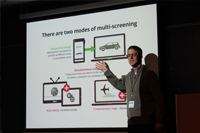


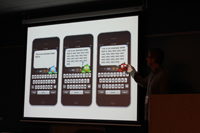
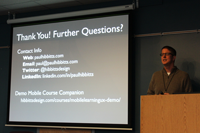
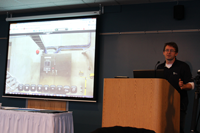
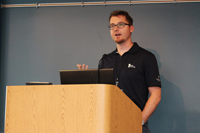
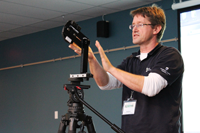
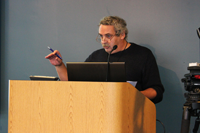


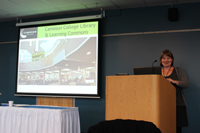




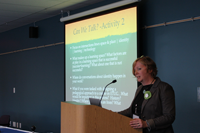


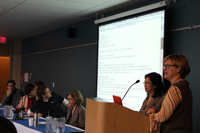
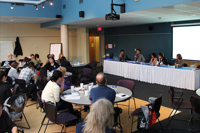

Leave a Reply
You must be logged in to post a comment.